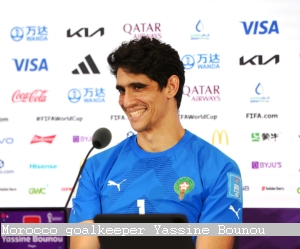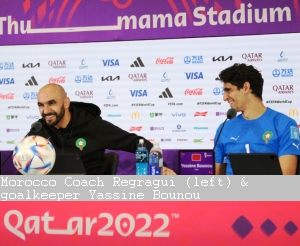By: Gordon D’Costa
Morocco became the first Arab nation and the fourth African team to progress to the semi-finals of the FIFA World Cup. Under the guidance of Head Coach Walid Regragui, the North African side has produced some astonishing results against European heavyweights, including Croatia, Belgium, Spain and Portugal to reach the last four in Qatar 2022.
Regragui, who took over the job as Morocco head coach at the end of August, has already shaped the team into a well-drilled, compact unit, which has created history. They held 2018 World Cup finalists in a goalless draw in the opening Group-F match and they defeated Belgium 2-0 before outplaying Canada 4-1 to top the group. In their first knockout appearance Morocco stunned former champions Spain, winning 3-0 on penalties after the match finished goalless in extra time. The Atlas Lions continued to roar and scored a shock 1-0 win against Portugal to reach the semis.

Morocco, unbeaten so far, have also kept four clean sheets in five matches and as compared to the other participating team, they have the best defensive record with only one goal conceded. That, too, was an own goal scored by defender Nayef Aguerd’s against Canada, in five matches.

The 47-year-old Regragui was impressed with the progress of his team and claimed that he has a tremendous group of players and heaped praise on his squad.
In response to a question if the success would inspire future generations in Morocco and Africa, he said, “That was my speech from the beginning. I tried to get it into their heads, that’s what I was saying earlier, that it’s good to participate in the World Cup. It’s nice. It’s fun. The fans are happy. They had started with a negative state of mind, before the first round everyone thought we were going home.”
“But, I kept telling the players that we have quality and we have players who play at a high level. [Hakim] Ziyech is at Chelsea, [Noussair] Mazraoui is at Bayern, [Achraf] Hakimi at Paris Saint-Germain, [Yassine] Bounou, also known as Bono, is a goalkeeper and [Youssef] En-Nesyri, a striker, both play for Sevilla are some of the key players in my team, so, honestly we have a unit that can win the World Cup and I told my players that they should be confident,” mentioned Regragui.
The Atlas Lions play with plenty of grit and determination and are united as a team. They defended resolutely and from the back built up their attacks and seized every opportunity to charge at the rival goal. From one such foray Youssef En-Nesyri headed the decisive goal in the 42nd minute to eliminate Portugal.
Earlier, in the quarter-finals, the Moroccans frustrated the Spaniards cutting down their threats and the contest finished scoreless and came down to penalties. Moroccan goalkeeper Yassine Bounou, also known as Bono, made two saves with another hitting the post, to help his country become only the fourth African country to reach the quarter-finals. Spain failed to beat Bounou from any of its three penalty attempts and Morocco took advantage, winning 3-0 in the penalty shootout to register a stunning upset of the European powerhouse.
Another feature of this Moroccan team is that 14 of the 26 footballers were born in another country, but they showed tremendous commitment and gave their best for the country.
Madrid-born Hakimi, who dealt the knockout blow to the country where he grew up, scored the match-winning spot-kick against Spain, the 2010 champions, at Education City Stadium in the quarter-finals.
Bounou, was born in Canada and spent eight years in Montreal before finally moving back to Morocco. The custodian came through Wydad Casablanca in the country of his origin, before joining Atletico Madrid, Girona, and finally Sevilla.
Regragui, born in France, pointed out that the Atlas Lions success story at Qatar is testimony that foreign-born players are capable of performing at the highest-level and ready to fight for their country and that is what I was fighting for. “I was determined and I have fought with the officials. Before the World Cup we had a lot of problems about the guys born in Europe and guys not born in Morocco and a lot of journalists said, ‘Why don’t we play with guys born in Morocco?’ “But, now with Morocco having reached the first-ever semi-finals, I believe that I have justified myself and my decision to include the foreign-born players.”
“Today I think we sent a real message, especially in terms of the game we played. We don’t have a typical background. We didn’t play with the small teams we played with the big guns. But still, we have done nothing. We made it and we are one game off from the finals. The other teams will have to be strong to beat us. We’ll recover and see how we are, but if we’re 100%, it’s going to be very, very hard to beat us. That’s the message I want to send to the team we will next face,” the Morocco Coach stated.
